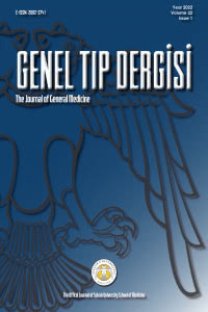Kronik Lenfositik Tiroiditli Olgular ve Normal Populasyonda D Vitamini Düzeylerinin Karşılaştırılması ve Otoimmünite Üzerindeki Rolü
BMI, Hashimoto tiroiditi, TSH, Vitamin D
Comparison of Vitamin D Levels in Patients with Chronic Lymphocytic Thyroiditis and the Normal Population, and Role of Vitamin D on Autoimmunity
BMI, Hashimoto's Tiroiditis, TSH, Vitamine D,
___
- 1) Jameson JL, Weetman AP.. In: Braunwald E, Fauci AS, Kasper DL, Hauser SL, LongoDL, Jameson JL, editors. translation editor: Sağlıker Y. Harrison Principles of Internaal Medicine (15. Edition). Istanbul: Nobel ; 2004. S.2060-2075
- 2) Hollick MF. Sunlight and vitamin D for bone health and prevention of autoimmune diseases, cancer and cardiovascular disease. Am J Clin Nutr 2004; 80 (6suppl): S1678- 88.
- 3) Holick MF. The Vitamin D epidemic and its health consequences. J Nutr 2005; 135:2739- 48.
- 4) Holick MF. Vitamin D: important for prevention of osteoporosis, cardiovascular heart disease, type 1 diabetes, autoimmune diseases, and some cancers. South Med J 2005; 98: 1024- 7.
- 5) Mathieu C, Van Etten E, Decallonne B, Guilietti A, Gyseman C, Bouillon R et al. Vitamin D and 1,25 dihydroxyvitamin D3 as modulators in immun system. J Steroid Biochem Mol Biol 2004; 89- 90: 449- 52.
- 6) Mathieu C. Adorini L. The coming age of 1,25 dihydroxyvitamin D3 analogs as immunomodulatory agents. Trends Mol Med 2002; 8: 174- 9.
- 7) İlicin G, Unal S, Biberoğlu K, Akalın S, Suleymanlar G, internal medicine volume 2, second edition Ankara: Gunes Kitapevi ISBN 975- 8531- 78- 6. S:2217- 2219.
- 8) Lin WY, Wan L, Tsai CH, Chen RH, Lee CC, Tsai FC. Vitamin D receptor gene polymorphisms are associated with risk of Hashimoto’s thyroiditis in Chinese patients in Taiwan. J Clin Lab Anal 2006; 20: 109- 12.
- 9) Erkal MZ, Wilde J, Bilgin Y, et al. High prevalence of vitamin D deficiency, secondary hyperparathyroidism and generalized bone pain in Turkish immigrants in Germany: identification of risk factors. Osteoporos Int. 2006;17:1133-1140.
- 10) Chistiakov DA. Immunogenetics of Hashimoto’s thyroiditis. J Autoimmune Dis 2005; 2: 1.
- 11) Fournier C, Gepner P, Sadouk M. In vivo beneficial effects of cyclosporine A and 1,25- dihydroxyvitamin D3 on the induction of experimental autoimmune thyroiditis. Clin Immunol Immunopathol 1990; 54: 53- 63.
- 12) Stefanic M, Papic S, Suver M. Association of vitamin D gene 3’- variants with Hashimoto’s thyroiditis in the Croatian population. Int J Immunogenet 2008; 35: 125- 31.
- 13) Youshiyuki Ban, Matsuo Taniyama, Yoshio Ban. Vitamin D receptor gene polymorphism in Hashimoto’s thyroiditis. Thyroid 2002; 11(6): 607- 608.
- 14) Engelsen O, Brustad M, Aksnes L. Daily duration of vitamin D synthesis in human skin with relation to latitude, total ozone, altitude, ground cover, aerosols and cloud thickness. Photochem Photobiol 2005; 81: 1287– 9.
- 15) Dawodu A, Absood G, Patel M, Agarwal M, Ezimokhai M, Abdulrazzaq Y, et al Biosocial factors affecting vitamin D status of women of childbearing age in the United Arab Emirates. J Bios Sci 1998; 30: 431- 7.
- 16) Nujen Çolak Bozkurt,; Basak Karbek,,et al the association between severity of vitamin d deficiency and Hashimoto’s thyroiditis DOI:10.4158/EP12376.OR
- 17) Kivity S, Agmon-Levin N, Zisappl M, et al. Vitamin D and autoimmune thyroid diseases. Cell Mol Immunol. 2011;8:243-247.
- 18) Goswami R, Marwaha RK, Gupta N, et al. Prevalence of vitamin D deficiency and its relationship with thyroid autoimmunity in Asian Indians: a community-based survey. Br J Nutr. 2009;102:382-386.
- 19) Pearce EN, Farwell AP, Braverman LE. Thyroiditis. N Engl J Med. 2003; 348:2646-2455.
- 20) Baeke F, Korf H, Overbergh L, et al. Human T lymphocytes are direct targets of 1,25-dihydroxyvitamin D3 in the immune system. J Steroid Biochem Mol Biol. 2010;121:221-227.
- 21) Cantorna MT, Zhu Y, Froicu M, Wittke A. Vitamin D status, 1,25- dihydroxyvitamin D3, and the immune system. Am J Clin Nutr. 2004;80:1717-1720.
- ISSN: 2602-3741
- Yayın Aralığı: 6
- Başlangıç: 1997
- Yayıncı: SELÇUK ÜNİVERSİTESİ > TIP FAKÜLTESİ
Amyotrofik lateral skleroz erken tanısında sinir iletim çalışmaları ve ayrık el bulgusunun önemi
Betül ÇEVİK, Orhan SÜMBÜL, Dürdane AKSOY, Semiha Gülsüm KURT
LABİOPLASTİ KONULU MAKALELERİN BİLİM HARİTALAMA TEKNİĞİ İLE ANALİZİ
Emre KUBAT, Tuna DEMİRKIRAN, Murat KADAN, Gökhan EROL, Cengiz BOLCAL
Pediatrik Ağır Travmatik Beyin Hasarında Mortaliteyi Etkileyen Faktörler
Emel UYAR, Harun DEMİRCİ, Pınar ÖZIŞIK, Serhan ÖZCAN, İrem BOZKURT, Seçil AKAY, Oktay PERK
Hüseyin ACAR, Ahmet KAYALI, Serkan BİLGİN, Pınar Yeşim AKYOL
Nadire ÜNVER DOĞAN, S. Ayhan ÇALIŞKAN
KOLON KANSERİ KÖK HÜCRELERİNDE AKTEOSİD’İN İNFLAMASYON VE/YADA APOPTOZA ETKİSİ VAR MIDIR?
Fatma FIRAT, Canan TÜRKOĞLU, Feyzan OZDAL KURT, Hafize Seda VATANSEVER
Ateş ve Karın Ağrısı ile Başvuran Aort Koarktasyonu: Olgu Sunumu
Murat SÜTÇÜ, Mustafa SORAN, Nazmi ŞİMŞEK, Derya ARSLAN
Farise YILMAZ, Hasan ÖNNER, Gonca KARA GEDİK, Ahmet Volkan ÇELİK, Özlem ŞAHİN, Çağlagül EROL
